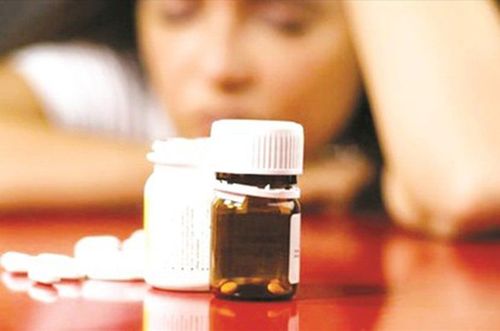This is an automatically translated article.
Phenobarbital 100 mg is an anticonvulsant and sedative drug, indicated in many cases to help prevent and treat seizures, treat sleep disorders. Find out more information about the drug through the article below.1. What is Phenobarbital?
Phenobarbital 100 mg is an anticonvulsant and sedative drug belonging to the group of other barbiturates. Phenobarbital has a synaptic enhancing or inhibitory effect similar to that of gamma aminobutyric acid (GABA) in the brain, reducing brain oxygen use during anesthesia, primarily through inhibition of neuronal activity. Inhibition of neuronal activity is the basis of the use of barbiturates to help prevent cerebral infarction when the brain is ischemic and in the event of traumatic brain injury.2. What are the uses of Phenobarbital 100?
The main effect of the drug is to treat and prevent convulsions, and also has a sedative effect to induce sleep. Phenobarbital 100 is indicated in the following cases:Seizures (except for minor epileptic seizures): Major seizures, partial seizures, myoclonic seizures. Prevention and treatment of recurrent febrile convulsions in young children. Treatment of tetanus contractions. Jaundice in neonates and patients with congenital free hyperbilirubinemia, congenital hemolysis and in patients with chronic intrahepatic cholestasis. Treatment of sleep disorders. Contraindications:
Do not use Phenobarbital 100 mg in the following cases:
Patients with hypersensitivity to Phenobarbital or to the ingredients in the drug. Patients with severe respiratory failure, difficulty breathing or airway obstruction. Patients with porphyria. Patients with liver failure or severe kidney disease. Pregnant and lactating women.
3. Dosage and how to use Phenobarbital
3.1. How to use
The drug is taken orally, the time of taking depends on the intended use of the drug.3.2. Dosage
Dosage for adults:For anticonvulsant cases: Take 60 - 250 mg per day, take 1 time or can be divided into small doses. Drink at the same time every day. Helps calm the mind: If used during the day use 30 - 120 mg, divided into two or 3 times daily. Sedation, sleep: Use with a dose of 100 - 320 mg, taken 30 minutes before bedtime. Do not use the drug for more than 2 weeks to treat insomnia. Anti-hyperbilirubinemia: Take 30 - 60 mg, 3 times a day. Usual pediatric dose:
Sedation: 2 mg/kg body weight daily and 3 times per day. Before surgery: Use at a dose of 1-3 mg/kg body weight. Anti-hyperbilirubinemia: Newborns use at a dose of 5-10 mg/kg body weight/day, in the first few days of life. Children up to 12 years: Use at a dose of 1 - 4 mg/kg body weight, 3 times daily. Anticonvulsant: Use 3-4 mg/kg/day in divided doses.
3.3. Overdose
Manifestations of overdose of barbiturates: Central nervous system depression from excessive sleep or deep coma and death; respiratory depression; hypoventilation and cyanosis; hypothermia, then there may be fever, loss of radiation, tachycardia, low blood pressure, oliguria. The pupils are often constricted, but if the poisoning is severe, they are dilated. In case of severe overdose, the patient often slows breathing, collapses, stops breathing and may die.Treatment: Supportive treatment, the most important is to help the patient's airway open, support breathing and give oxygen. In case of severe poisoning, anuria or patients in shock, peritoneal dialysis or hemodialysis should be performed.
4. Undesirable effects when using Phenobarbital 100 mg
When taking Phenobarbital 100 mg you may experience the following side effects: when taking Phenobarbital 100 mg you may experience the following side effects:
Common: Drowsiness, nystagmus, ataxia movements, irritation or confusion in elderly patients, skin rashes due to allergies. Uncommon: Affects bone causing rickets, osteomalacia, osteodystrophy, myalgia (common in children 1 year after drug therapy), arthralgia. Rare: Megaloblastic anemia due to folic acid deficiency. When taking the drug, you need to inform your doctor about any unwanted effects if you experience when using the drug.
5. Notes when using Phenobarbital 100
This is a prescription drug, used only when indicated, before using it is necessary to inform the doctor about the history of allergies and medical conditions encountered.You need to be careful when using drugs for people such as patients with a history of drug addiction, alcoholism; people with mild to moderate renal impairment; elderly people (over 65 years old);
When taking the drug, you strictly follow the instructions and do not suddenly stop the drug, especially in patients with epilepsy, people with depression.
In the case of sleep disorders, the cause and contributing factors to insomnia should be evaluated. Do not abuse to treat insomnia, but should apply measures to support sleep. It is advisable to seek medical attention to find the cause of insomnia and to receive appropriate treatment.
Pregnancy: Phenobarbital crosses the placenta. Mothers treated with phenobarbital have a 2 to 3 times higher risk of having a baby with a birth defect. Therefore, this medicine must not be used by pregnant women.
Lactation: Phenobarbital is known to be excreted in breast milk, the drug may accumulate in the milk and in the body to the point where blood levels of the infant may be higher than in the mother and cause sedation in the infant. , because of these risks, should not be used by women who are breast-feeding.
Drug interactions:
Phenobarbital is a strong inducer involved in the metabolism of many drugs. The drug reduces the concentration of Felodipine, Nimodipine in the blood plasma, the drug reduces the effect of Corticoids, Cyclosporin, Quinin, Folic Acid, Doxycycline. Phenobarbital and tricyclic antidepressants: Tricyclic antidepressants may increase the risk of generalized seizures. It is necessary to increase the dose of antiepileptic drugs. Phenobarbital and other antidepressants, H1-antagonists, benzodiazepines, clonidine, morphine derivatives, neuroleptics, anti-anxiety drugs,... increase the inhibitory effect on the central nervous system when used in combination. fit. Phenobarbital and oral anticoagulants: The effect of anticoagulants is reduced, so if combined, blood prothrombin should be regularly checked. Anticoagulation dose adjustment is required during co-treatment with phenobarbital and for 8 days after discontinuation of phenobarbital. Phenobarbital and methotrexate : The hematological toxicity of methotrexate is increased by greater inhibition of dihydrofolate reductase. Phenobarbital when taken with alcohol: Alcohol increases the sedative effects of phenobarbital and can have dangerous consequences. Therefore, alcohol should be avoided while taking the drug. Because the drug has a sedative effect, it should not be used by people who have to operate machinery or drive.
Store the medicine at a temperature below 30 degrees Celsius, in a cool dry place, away from light. Keep medicine out of reach of children.
Hopefully, with the above information about Phenobarbital, you already know what the drug works and when to use it. To be safe, do not self-medicate and only use under the direction of a doctor.
Please dial HOTLINE for more information or register for an appointment HERE. Download MyVinmec app to make appointments faster and to manage your bookings easily.













